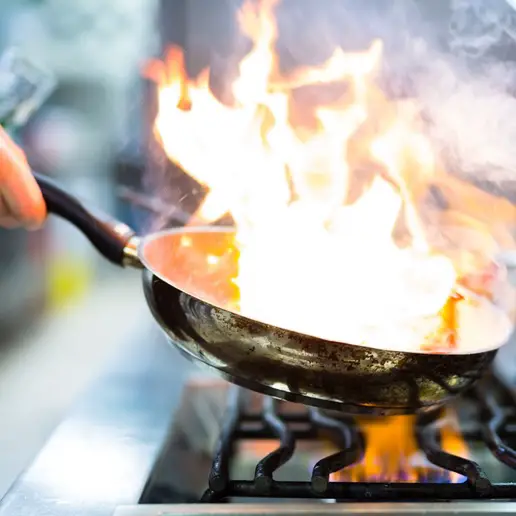Professional chefs maintain strict safety standards in their kitchens for good reason. What might seem like minor oversights at home could lead to serious consequences in a professional setting. Here are eight dangerous kitchen habits that professional chefs always avoid – and why you should too.
Never washing hands between tasks

According to food safety guidelines, proper handwashing requires at least 20 seconds with soap and warm water. Professional chefs wash their hands constantly – before starting work, after handling raw ingredients, between different tasks, and after touching potentially contaminated surfaces.
Research shows most home cooks significantly underestimate how often they should wash their hands while preparing food. A single contaminated surface can spread bacteria throughout your entire kitchen within minutes.
Storing raw meat above ready-to-eat foods
Raw meat should always occupy the lowest shelf in your refrigerator. This prevents any drips or leaks from contaminating other foods below. Professional kitchens maintain strict storage protocols with designated areas for different types of ingredients.
Using sealed containers for raw meat provides an extra layer of protection. Even a tiny drop of raw meat juice can contain enough bacteria to cause serious illness.
Using the same cutting board for everything

Cross-contamination through cutting boards is a major concern in professional kitchens. Chefs use separate boards for raw meat, vegetables, and ready-to-eat foods. Many restaurants implement color-coding systems to prevent mix-ups.
Wooden cutting boards can harbor bacteria in their scratches and grooves. Professional kitchens often use commercial-grade plastic boards that can withstand high-temperature sanitization.
Thawing food on the counter
The “quick thaw” on the counter might seem convenient, but it’s a practice that makes professional chefs cringe. The proper thawing methods include using the refrigerator, cold water bath, or microwave defrost setting.
Room temperature thawing creates an ideal environment for bacterial growth. The outer layers of food can reach dangerous temperatures while the center remains frozen.
Not using a food thermometer

Visual cues aren’t reliable for determining safe cooking temperatures. A UC Davis study found that 40% of home cooks undercook their chicken when relying on appearance alone.
Professional chefs verify internal temperatures for every protein they cook. Different meats require different minimum temperatures for safety, making a reliable food thermometer essential kitchen equipment.
Wearing improper footwear in the kitchen
Professional kitchens require closed-toe, non-slip shoes for good reason. Hot liquids, sharp objects, and slippery floors create a dangerous environment for exposed feet.
Investing in proper kitchen footwear can prevent serious injuries. One dropped knife or pot of boiling water can result in severe burns or cuts.
Improper storage of cleaning chemicals
Professional kitchens maintain strict separation between food items and cleaning supplies. All chemicals must be clearly labeled and stored away from food preparation areas.
Even small amounts of cleaning products can contaminate food and cause serious illness. Professional chefs never store chemicals above food storage or preparation areas.
Using damp towels for multiple purposes
Professional kitchens use designated towels for specific tasks and replace them frequently. Using the same towel for wiping counters, handling hot items, and drying hands creates a breeding ground for bacteria.
Kitchen towels should be changed regularly throughout the day. Many professional kitchens use color-coded towels to prevent cross-contamination between different areas and tasks.
Maintaining a professional level of kitchen safety doesn’t require industrial equipment or extensive training. By avoiding these dangerous habits and implementing proper safety protocols, home cooks can significantly reduce their risk of foodborne illness and kitchen accidents. Remember, these practices exist for a reason – they’re the result of years of professional experience and scientific research into food safety.

